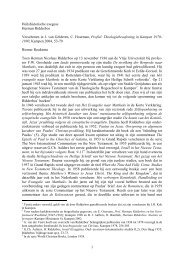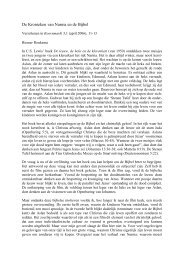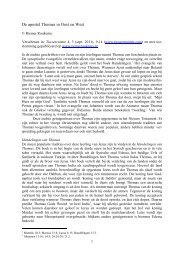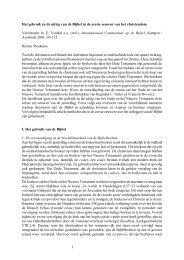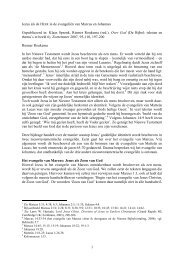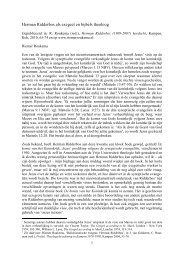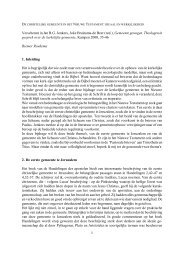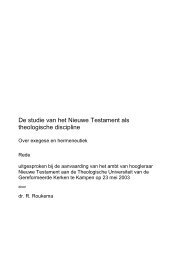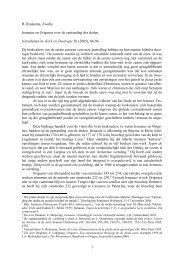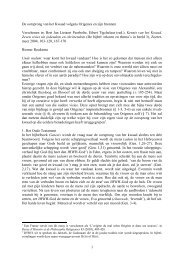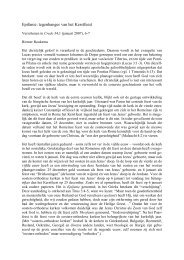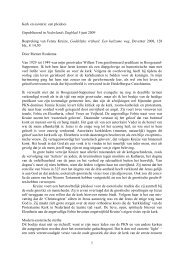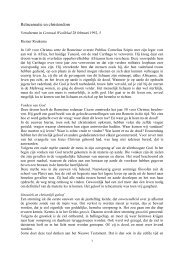Herman Ridderbos‟s Redemptive -historical ... - Riemer Roukema
Herman Ridderbos‟s Redemptive -historical ... - Riemer Roukema
Herman Ridderbos‟s Redemptive -historical ... - Riemer Roukema
Create successful ePaper yourself
Turn your PDF publications into a flip-book with our unique Google optimized e-Paper software.
which a human being can distinguish in it. And therefore that which takes place<br />
between Jesus and the Father, between the Messiah and his God, is what determines<br />
the meaning and character of his suffering and death.” (84; italics H. N. R.). He<br />
continues by pointing to Mark 10:45 and 14:24 as texts that deal with Jesus‟<br />
vicarious death, in which “lies the meaning of his hidden Messianic passion” (84).<br />
This is the first time that Ridderbos explicitly speaks of the “redemptive<strong>historical</strong>”<br />
meaning of Jesus‟ suffering and death. From this moment onward, the<br />
term will take a central place in his work.<br />
The Coming of the Kingdom (1950 in Dutch)<br />
In his book The Coming of the Kingdom Ridderbos repeatedly uses the term<br />
“redemptive-<strong>historical</strong>”. In the introduction he explains why. In earlier books he<br />
responded to the nineteenth and early twentieth century liberal views of Jesus. He<br />
valued some elements of these views, for instance Albert Schweitzer‟s renewed<br />
emphasis on the eschatological character of Jesus‟ teaching. Ridderbos felt, however,<br />
that Schweitzer had swung too much toward the other extreme. Neither did he<br />
feel comfortable with Karl Barth‟s and Rudolf Bultmann‟s existentialistic interpretations,<br />
again in spite of a partial appreciation of these. Ridderbos found a<br />
kindred spirit in Oscar Cullmann, who taught in Strasburg, Paris, and Basel, and<br />
who strongly inspired him. Cullmann argues in his book Christus und die Zeit. Die<br />
Urchristliche Zeit- und Geschichtsauffassung, published in 1946, 41 that the linear<br />
view of time is a characteristic of Biblical eschatology and soteriology. 42 He regards<br />
redemptive history as the core of New Testament preaching and is of the opinion<br />
that whoever denies this, opposes himself to the teachings of Christianity. Cullmann<br />
rejects the reconstructions of exegetes such as Schweitzer and Bultmann, because<br />
redemption as proclaimed in the Gospel of Christ is linked to a continuous event<br />
spanning past, present, and future. “It was as if I had been waiting for this”, Ridderbos<br />
later commented. 43 Furthermore, it became clear during this time that other<br />
exegetes were also of the view that the kingdom that Jesus preached was both<br />
present and future, and had therefore not merely arrived either immanently or<br />
eschatologically. Ridderbos mentions the names of J. Jeremias, E. Stauffer, H. M.<br />
Matter and W. G. Kümmel, amongst others (xxviii).<br />
This development forms the background to his book The Coming of the<br />
Kingdom, in which Ridderbos states: “That which Jesus preaches is not a timeless<br />
truth, and what he brings is not only a new spirituality, a new disposition. No more<br />
is it a new form of society (in the sense of the social gospel) or an action carried on<br />
by men and slowly developing to its consummation. The coming of the kingdom of<br />
God is most certainly to be looked upon as the realization of the great drama of the<br />
history of salvation in the sense of the Old Testament and of the Jewish apocalypses.<br />
This realization is not merely a matter of the future, however. It has started. The<br />
41 Zürich-Zollikon: Evangelischer Verlag, 1946. English translation: Christ and Time: The Primitive<br />
Christian Conception of Time and History (transl. Floyd V. Filson; London: S. C. M. Press, 1951; 3 rd<br />
rev. ed. Philadelphia: The Westminster Press, 1975).<br />
42 See also Cullmann‟s paper Le retour du Christ. Espérance selon le Nouveau Testament (Neuchâtel<br />
/ Paris: Delachaux et Niestle, 1945, 2 nd ed.), mentioned by Ridderbos.<br />
43 In a conversation with the author on January 13, 2004.<br />
7



